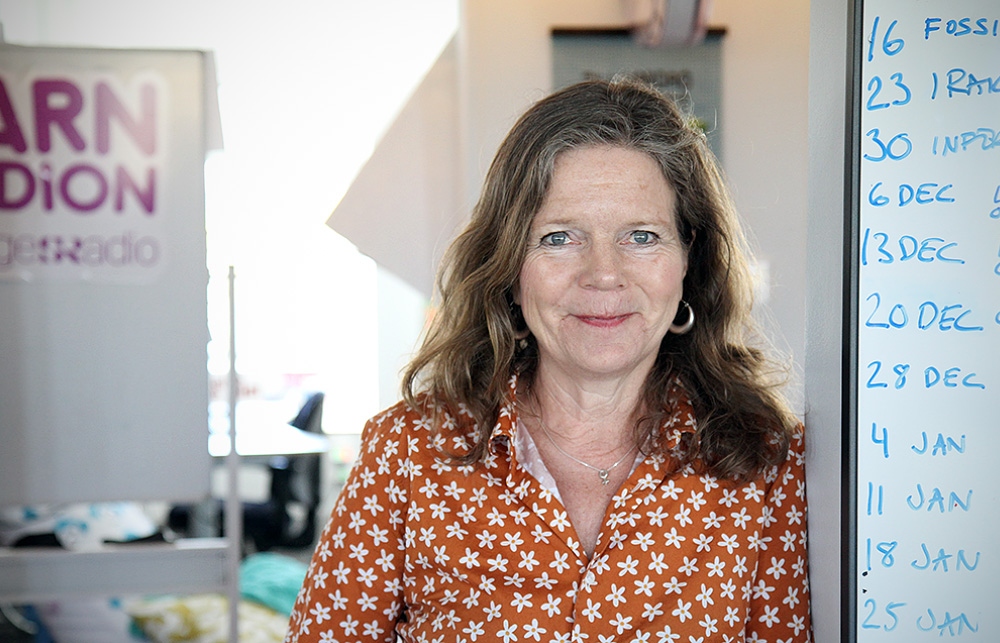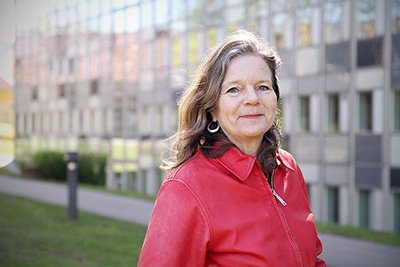Science journalist on the rise

After a long and devoted service, her career received an extra boost. First through an award-winning interview with Iggy Pop, then as a contestant on På spåret. Now Lena Nordlund, a science journalist, can also call herself an honorary doctor at KTH.
“I ended up getting a doctorate anyway, but in a different way,” says Nordlund, who was once advised against embarking on a research career by a professor at KTH.
We meet her in the Swedish Radio's grey colossal building next to Gärdet, which has been her workplace for three decades. Her assignments have ranged from reports in Vetenskapsradion and features in P2's cultural programme to lighter programmes such as Kossornas planet and long documentaries or personal portraits.
What is it that has kept her here? With a confident radio voice and dressed in worn jeans, a studded belt and black boots, she explains:
“It's the most fun job in the world. As a science journalist, you get to dive into so many different issues and topics. Learning new things all the time is a lot of fun and I also think the mission is very important.”
Reaching out to listeners
The motivation for the honorary doctorate emphasises her ability to reach out to new audiences, for example by weaving the human aspect into science. If science becomes too theoretical, it is difficult to raise interest”, she says.
“It's about connecting with the listener, and about how science can affect us in our everyday lives. And if you're going to talk about something very difficult, like particle physics or maths, you might have to bring in the scientist and his or her driving force. It can turn into an interesting personal story.”
As a chemist graduating from KTH in the late 1980s, she envisioned her own career in academia. She enjoyed working at the then Department of Biochemical Technology and was drawn into the positive spirit that prevailed when interest in DNA technology exploded.
But it soon became clear that she was not a researcher talent.
Interviewing a teen idol
“That's why it's particularly gratifying to be awarded an honorary doctorate at KTH. And the chemistry programme was not a waste of time. I've used it as important background knowledge in how I approach science, and in not having too much respect for researchers.”
One of the highlights of her career was when she got to interview her childhood idol Iggy Pop. After 11 years of “low-intensity nagging”, she finally managed to lure him to the radio microphone.
“During the years of chasing him, the radio show I wanted him on had been cancelled and the original interview angle had become obsolete,” she says:
“So when he accepted, I had no idea what I was going to interview him about. But then I thought I'd do a health programme about Iggy and his body because he has lived a very hard life. Then it also became a cultural programme and a documentary about how self-absorbed I was when I was chasing Iggy Pop,” she says, laughing.
Turning point at work
The radio programmes were rewarded with the Guldörat award. And out of the blue she was asked to take part in the quiz programme På spåret, where she had to compete with journalist Niklas Källner.
“It was like a turning point for me. I had been a bit depressed after the pandemic, and didn't think the job was as fun. Then I got the interview, and it has peaked a bit after that. I have Iggy Pop to thank for that.”
Given the state of the world and the constant stream of new findings, science journalism is becoming increasingly important, she says.
“We all need to be informed and understand science, what's happening to the climate, how AI is developing, and medical ethics. As citizens, we may need to take a stand and we must then understand the fateful issues of our time.”
Text: Christer Gummeson (gummeson@kth.se)

